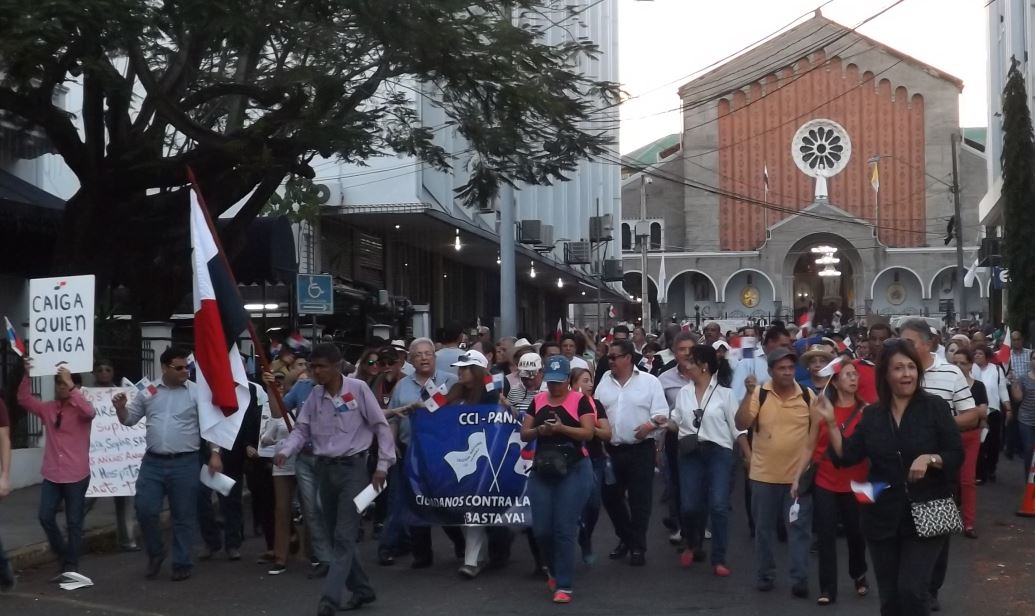
Odebrecht and the system retreat to old new defenses
by Eric Jackson
The late anti-apartheid leader Steven Biko famously noted that the oppressor’s most powerfui weapon is the mind of the oppressed. It seems that this idea forms the basis for the new postures of a mortally embarrassed and ever retreating Panamanian political culture in the face of the Odebrecht scandal. Too many things have become known and somebody will take a fall, but the operating principle of those whose public lives are at stake is that Panamanian minds conditioned to certain ways of thinking and can be misdirected.
Forget about that stuff about the constitutional separations of power in Panaam. Hardly anybody believes that those are real and even fewer people trust the courts, the prosecutors, the comptroller general or the legislature to act against the culture of bribery. President Varela’s pleas that the Odebrecht scandal is not his department are being carried away on the dry season winds. Things that a few weeks ago he said that he couldn’t do he is now saying that he will do. The government has become a complainant in the Odebrecht bribery case. Varela is calling for audits of all Odebrecht public works contracts, including those during his administration. Notice has been served on Odebrecht that the government is pulling out of its partnership with that company for the Chan 2 hydroelectric project.
But still there are key ideas behind which those under theaat seek refuge, none more important than the notion that Panama was born of acts of bribery and betrayal and in the end will continue to operate on those principles. That sort of fatalism has long served this country’s political caste whenever public indignation has been aroused. But there are also the ideas that:
- The Americans will take care of everything
- Business principles usually trump civic ideals to solve problems
- The privacy of individuals, families and companies must be protected
- Although the rule of law has broken down we must preserve its vestiges or else…
The US Justice Department brought charges, made an out of court settlement and issued a press release about Odebrecht bribery in Panama from mind-2009 to mid-2014. Those are the Martinelli years, but Odebrecht has been getting public contracts here since 2006 and has been awarded several during the Varela years. Donations to foundations and political action committees, followed by lucrative public works contracts, suggest a long history of Odebrecht bribery of both Republicans and Democrats in the State of Florida but the feds are have shown no interest in that. The Justice Department bombshell alleged $59 million in Odebrecht bribes to Panamanian officials and suggested that some $4 million of these went through former President Martinelli’s two sons — so Panama’s Attorney General Kenia Porcell took those numbers as working figures and said that Odebrecht had agreed to pay $59 million to the Panamanian government in compensation. But a Swiss investigation found that the amount of money involved was much bigger than what the Americans say, and froze some $32 million in the Swiss bank accounts of Martinelli’s sons. Meanwhile Ricardo Martinelli has an INTERPOL warrant out for his arrest but is living in luxurious exile in Miami. There is no indication yet of whether Donald Trump will continue to protect THIS Latin American criminal who has migrated to the United States under irregular circumstances. Perhaps because Trump is so brazenly racist against Latin Americans, the notion of Panama having a US savior seems particularly incongruous at the moment, even if Porcell’s declarations have that as an underlying premise.
Yes, Panama and its canal exist in large part because local business interests found them useful. The railroad company and local business owners and professionals pulled off the 1903 coup in part by bribery of the Colombian garrison and successive generations have lubricated the wheels of commerce and politics with a bribe here and there ever since. But whenever that sort of corruption has gotten out of hand it has been bad for business. That’s one of the lessons drawn from the Noriega crisis of the late 1980s. At the moment business rating companies like Fitch are calling Odebrecht a bad investment. They got caught, they were too brazen and across the world they are getting kicked off of large construction projects. Of more immediate business interest to Panama, several of their ongoing contracts call for Odebrecht to have specified lines of credit or to post performance bonds in specific amounts and it turns out that Odebrecht can no longer get such financiing or insurance. The whole point of no-bid contracts for Odebrecht was that they were too big to fail, but now they’re too odious to finance or insure and the conventional business wisdom has been stood on its head. Whether Panamanians will go the next step and reconsider the premises of prequalification for government contracts and whether they truly serve Panama’s intreests remains to be seen but the whole business convenience argument in favor of Odebrecht has evaporated.
The Electoral Tribunal tells us that it would be an invasion of privacy to name those politicians who received campaign contributions from Odebrecht. The US Justtice Department says that it’s an invasion of privacy to name the individuals who accepted bribes from Odebrecht, even though in some cases they can be identified from what has been described about them. “Economic privacy” — banking and corporate secrecy laws — have this country on public and private international blacklists that are making the financial transactions of businesses and individuals in Panama ever more difficult. And what’s that INTERPOL warrant for Martinelli about? It’s about how he ordered hackers to turn people’s cell phones and computers into bugs, using the data he received — things like arguments between spouses — for political attack ads and blackmail. Frightened judges and politicians will play privacy cards as they will, but perhaps ordinary Panamanins will come to see privacy with different dimensions and proportions than they recognized before.
Panamanian courts are nests of bribery. The higher one goes the worse it gets. Our prosectuors are notious guardians of the double standard and dispensers of selective law enforcement decisions. Does Kenia Porcell argue that she’s not like that? We shall see. Notice, however, that the first thing that her office did when the Panama Papers revelations hit the worldwide press was to mount an unsuccessful attempt to identify and prosecute the “John Doe” who leaked the documents. Then, on a day when people were marching in the streets to protest against corruption, the morning newspapers featured the story about how Porcell had stopped the investigations about crimes outlined in those papers because one of the Mossack Fonseca partners filed a court challenge against the probe. Yes, that’s the rule of law and by the way, the legislature is proposing to change the law to allow companies caught paying bribes to be let off the hook if they confess and pay up, and to allow such deals to immunize those who took the bribes from having to answer for that. Now, however, the distinction between the rule of law and impunity embedded in legal procedures is being pointed out to an exasperated public.
How does it end? We shall see. The legal system declaring that nothing happened is a distinct possibility. The survival of reputations and political careers is much less likely.
~ ~ ~
These announcements are interactive. Click on them for more information.










